BusinessEurope Headlines No. 2016-40
BusinessEurope Council of Presidents met in Bratislava
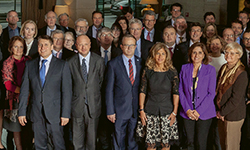 On the invitation of Republikova Unia Zamestnavatelov (RUZ) - the business federation of Slovakia - the Council of Presidents of BusinessEurope met on 24 and 25 November in Bratislava. The Presidents of our 40 member federations were received by President of the Slovak Republic Andrej Kiska. They also had an exchange of views with the Deputy Prime Minister Peter Pellegrini on the achievements of the Slovak presidency and the remaining challenges. In this context, President Marcegaglia stressed that “We need competitive companies. We need Europe and we need trade. To make Europe a better place to invest and create jobs, Member States and EU institutions must pull in the same direction to strengthen the single market, the common trade policy and the Euro area”. During their Council meeting, the Presidents of BusinessEurope member federations discussed the results of the US elections and had a debate on the rise of isolationism and protectionism and how to strengthen the European Union capacity to answer companies and citizens’ concerns.
On the invitation of Republikova Unia Zamestnavatelov (RUZ) - the business federation of Slovakia - the Council of Presidents of BusinessEurope met on 24 and 25 November in Bratislava. The Presidents of our 40 member federations were received by President of the Slovak Republic Andrej Kiska. They also had an exchange of views with the Deputy Prime Minister Peter Pellegrini on the achievements of the Slovak presidency and the remaining challenges. In this context, President Marcegaglia stressed that “We need competitive companies. We need Europe and we need trade. To make Europe a better place to invest and create jobs, Member States and EU institutions must pull in the same direction to strengthen the single market, the common trade policy and the Euro area”. During their Council meeting, the Presidents of BusinessEurope member federations discussed the results of the US elections and had a debate on the rise of isolationism and protectionism and how to strengthen the European Union capacity to answer companies and citizens’ concerns.
Contact: Thérèse de Liedekerke
Investment Plan for Europe – are we there yet?
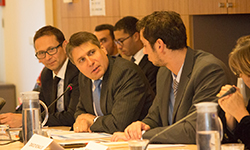 “Investment is slowly improving, but the gap is still very large. The European Fund for Strategic Investments (EFSI) is an important tool welcomed by businesses. But we will only make a real impact on investment if we turn Europe into a friendly place for business development. This is why the regulatory barriers of the investment plan is the most important in the long run,” said Markus J. Beyrer, Director General of BusinessEurope, during a panel debate with representatives from the European Parliament, EFSI, business, and think tanks, organised as part of the InvestWeek initiative. Markus J. Beyrer presented the just published position paper of BusinessEurope on extending the European Fund for Stratigic Investment which can be found here.
“Investment is slowly improving, but the gap is still very large. The European Fund for Strategic Investments (EFSI) is an important tool welcomed by businesses. But we will only make a real impact on investment if we turn Europe into a friendly place for business development. This is why the regulatory barriers of the investment plan is the most important in the long run,” said Markus J. Beyrer, Director General of BusinessEurope, during a panel debate with representatives from the European Parliament, EFSI, business, and think tanks, organised as part of the InvestWeek initiative. Markus J. Beyrer presented the just published position paper of BusinessEurope on extending the European Fund for Stratigic Investment which can be found here.
![]() Contact: Joana Valente
Contact: Joana Valente
B20 prepares its recommendations for the G20 leaders
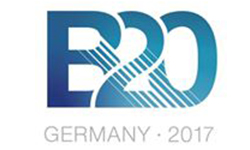 The B20 – the Business community of the G20 – has already launched its discussions under Germany’s Presidency of the G20. The work is divided in Taskforces, each discussing a key area under the general theme of “Resilience, Responsibility, Responsiveness – Towards a Future-oriented, Sustainable World Economy”. The B20 Taskforces meet on 1 and 2 December in Berlin to prepare their recommendations for the G20 leaders. BusinessEurope’s President Emma Marcegaglia chairs the B20 Trade and Investment Taskforce. Besides, BusinessEurope is also actively involved in the Digital, SMEs and Climate & Resource Efficiency Taskforces. Overall, B20’s recommendations to the G20 aim to create a sustainable global economy where, businesses compete on a level playing field, while, at the same time, greater societal concerns are effectively addressed. These recommendations will be officially presented in May 2017, at the B20 Summit in Berlin.
The B20 – the Business community of the G20 – has already launched its discussions under Germany’s Presidency of the G20. The work is divided in Taskforces, each discussing a key area under the general theme of “Resilience, Responsibility, Responsiveness – Towards a Future-oriented, Sustainable World Economy”. The B20 Taskforces meet on 1 and 2 December in Berlin to prepare their recommendations for the G20 leaders. BusinessEurope’s President Emma Marcegaglia chairs the B20 Trade and Investment Taskforce. Besides, BusinessEurope is also actively involved in the Digital, SMEs and Climate & Resource Efficiency Taskforces. Overall, B20’s recommendations to the G20 aim to create a sustainable global economy where, businesses compete on a level playing field, while, at the same time, greater societal concerns are effectively addressed. These recommendations will be officially presented in May 2017, at the B20 Summit in Berlin.
Contact: Luisa Santos
What makes European industry competitive?
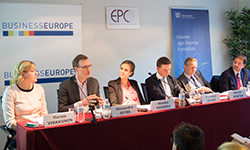 “Industry is the core of our economy and the basis for healthy regions across Europe. We must do everything we can to strengthen European industry. This includes an ambitious industrial strategy by the European Commission,” said BusinessEurope Director for Industrial Affairs Alexandre Affre during a policy dialogue organised by the European Policy Centre about what matters to make European industry competitive. On this occasion Assolombarda also presented their recent study “The performance of European firms: a benchmark analysis”, which builds on a comprehensive survey of 650 companies in the most dynamic regions of Europe. This study emphasizes that where industry is strong, the region greatly contributes to EU value added. It also indicates what makes a firm a top performer. A management of human resources that remunerates individual productivity through bonuses, a medium to high level of firm’s digitalisation, the protection of intellectual property through patents and a high degree of participation at Global Value Chains (GVCs) are the specific traits associated to top performing firms.
“Industry is the core of our economy and the basis for healthy regions across Europe. We must do everything we can to strengthen European industry. This includes an ambitious industrial strategy by the European Commission,” said BusinessEurope Director for Industrial Affairs Alexandre Affre during a policy dialogue organised by the European Policy Centre about what matters to make European industry competitive. On this occasion Assolombarda also presented their recent study “The performance of European firms: a benchmark analysis”, which builds on a comprehensive survey of 650 companies in the most dynamic regions of Europe. This study emphasizes that where industry is strong, the region greatly contributes to EU value added. It also indicates what makes a firm a top performer. A management of human resources that remunerates individual productivity through bonuses, a medium to high level of firm’s digitalisation, the protection of intellectual property through patents and a high degree of participation at Global Value Chains (GVCs) are the specific traits associated to top performing firms.
Read more or contact: Nicolas Rathauscher
BusinessEurope stresses role of business in green transition
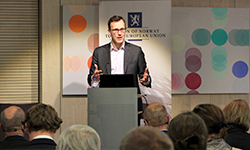 Industrial affairs director Alexandre Affre stressed the important role of business in the green transition during a morning event held at the Mission of Norway to the European Union on 29 November. He said that “Business innovation and investments require long-term regulatory signals; as such signals that help create the business case for innovation in fields of the circular economy and the low-carbon economy”. His remarks were shared by Gregorz Radziejewksi, member of the cabinet of Commission Vice President Katainen. Other important issues raised were the focus to engage consumers and continue on the route to enhancing funding for research and innovation to reach Europe’s targets.
Industrial affairs director Alexandre Affre stressed the important role of business in the green transition during a morning event held at the Mission of Norway to the European Union on 29 November. He said that “Business innovation and investments require long-term regulatory signals; as such signals that help create the business case for innovation in fields of the circular economy and the low-carbon economy”. His remarks were shared by Gregorz Radziejewksi, member of the cabinet of Commission Vice President Katainen. Other important issues raised were the focus to engage consumers and continue on the route to enhancing funding for research and innovation to reach Europe’s targets.
Contact: Leon de Graaf
What do we want from trade policy?
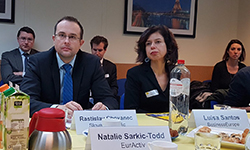 Trade has become a sensitive topic and subject to extensive public debate in many countries around the world. In the EU, the long and complex process leading to the signature of the EU-Canada agreement has fuelled the discussions around trade policy. What we want to achieve from trade agreements, how to ensure trade is more inclusive and how to communicate the benefits of trade to the wider public were among the topics discussed in two events organised this week by Euroactive and Politico. BusinessEurope defended its believe that concluding and implementing ambitious trade agreements is the only way for Europe to remain relevant in a changing trade environment with emerging players and new supply chains. We need to open new market opportunities outside Europe to create a more balanced competitive environment that will help companies to invest and create jobs. Trade policy can leverage EU standards, provided we are able to conclude and implement comprehensive trade agreements that deliver on our key economic interests.
Trade has become a sensitive topic and subject to extensive public debate in many countries around the world. In the EU, the long and complex process leading to the signature of the EU-Canada agreement has fuelled the discussions around trade policy. What we want to achieve from trade agreements, how to ensure trade is more inclusive and how to communicate the benefits of trade to the wider public were among the topics discussed in two events organised this week by Euroactive and Politico. BusinessEurope defended its believe that concluding and implementing ambitious trade agreements is the only way for Europe to remain relevant in a changing trade environment with emerging players and new supply chains. We need to open new market opportunities outside Europe to create a more balanced competitive environment that will help companies to invest and create jobs. Trade policy can leverage EU standards, provided we are able to conclude and implement comprehensive trade agreements that deliver on our key economic interests.
Contact: Luisa Santos
BusinessEurope supports EU Commission’s Start-up and Scale-up Initiative
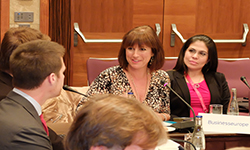 “BusinessEurope strongly welcomes the European Commission Start-up and Scale-up Initiative,” said Marta Marti, Chair of BusinessEurope’s SME Committee, in the meeting of the SME Envoy Network held in Bratislava on 23 November. The initiative will facilitate access to markets, to venture capital and to ecosystems supporting entrepreneurship. At the same time, Marta Marti expressed BusinessEurope’s concerns regarding the current negotiations on geo-blocking, which leave important issues not clarified regarding applicable law. Additionally, Marta Marti and Director for Entrepreneurship and SMEs, Daniel Cloquet took actively part in the discussion on the implementation of the Start-up and Scale-up Initiative, which started at the European SME Assembly organised by the Commission with all SME stakeholders in Bratislava on 24-25 November.
“BusinessEurope strongly welcomes the European Commission Start-up and Scale-up Initiative,” said Marta Marti, Chair of BusinessEurope’s SME Committee, in the meeting of the SME Envoy Network held in Bratislava on 23 November. The initiative will facilitate access to markets, to venture capital and to ecosystems supporting entrepreneurship. At the same time, Marta Marti expressed BusinessEurope’s concerns regarding the current negotiations on geo-blocking, which leave important issues not clarified regarding applicable law. Additionally, Marta Marti and Director for Entrepreneurship and SMEs, Daniel Cloquet took actively part in the discussion on the implementation of the Start-up and Scale-up Initiative, which started at the European SME Assembly organised by the Commission with all SME stakeholders in Bratislava on 24-25 November.
Contact: Daniel Cloquet
Joint industry statement on the free flow of data
 On 29 November, BusinessEurope, DIGITALEUROPE, COCIR, AIOTI and ACEA released a joint industry statement on the free flow of data. Calling for legislation to remove and prevent unjustified localisation restrictions, the statement supports the abilities of businesses to transfer data across borders. Digitalisation can be at the heart of Europe – please read the full statement here.
On 29 November, BusinessEurope, DIGITALEUROPE, COCIR, AIOTI and ACEA released a joint industry statement on the free flow of data. Calling for legislation to remove and prevent unjustified localisation restrictions, the statement supports the abilities of businesses to transfer data across borders. Digitalisation can be at the heart of Europe – please read the full statement here.
![]() Contact: Patrick Grant
Contact: Patrick Grant
Assess the impact of new bank capital rules
 Assess the effects of newly proposed capital requirements for banks before validating and finalising them, BusinessEurope President Emma Marcegaglia wrote to Mario Draghi as Chairman of the Group of Governors and Heads of Supervision (GHOS) to which the Basel Committee reports. It is important to avoid significant negative effects on the cost and availability of lending capacity in the EU and also of risk management products for non-financial companies. The banking sector in Europe today provides approximately 80% of credit to the economy and alternative sources of financing for businesses are still limited, especially for small and medium-sized companies as the development of a Capital Markets Union will take time.
Assess the effects of newly proposed capital requirements for banks before validating and finalising them, BusinessEurope President Emma Marcegaglia wrote to Mario Draghi as Chairman of the Group of Governors and Heads of Supervision (GHOS) to which the Basel Committee reports. It is important to avoid significant negative effects on the cost and availability of lending capacity in the EU and also of risk management products for non-financial companies. The banking sector in Europe today provides approximately 80% of credit to the economy and alternative sources of financing for businesses are still limited, especially for small and medium-sized companies as the development of a Capital Markets Union will take time.
![]() Contact: Erik M. Berggren
Contact: Erik M. Berggren
The importance of business in the circular economy
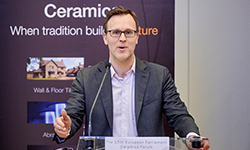 “Business is very much on board with the move. Business is doing so because it makes business sense, not to try and play catch up with policy initiatives,” said Industrial affairs director Alexandre Affre during this keynote speech on the importance of business in the circular economy and the reform of the EU emissions trading system (EU-ETS) during the Ceramic Days 2016 on 29 November. He added “What business needs is that EU institutions to boost actions towards ‘smart policy’. Smart policy is about looking at existing barriers for business to embrace the circular economy. For this, policymakers need to make the best use of existing legislation in order to create hundreds of thousands of jobs and billions of net savings.” BusinessEurope is discussing several actions with its members to highlight the importance of smart policy, in particular, by setting up an EU circular economy industry platform. The platform will showcase good practices of how EU business is adding to the circular economy, and show what is hindering industry in terms of barriers. On the EU ETS reform, Alexandre Affre started by welcoming the speedy ratification of the Paris Agreement, but pointed out that all countries should now stick to their promises. For Europe, the EU ETS reform is a success if it manages to reach the 43% emission reduction in European industry, while maintaining Europe’s global competitiveness. He continued that “Europe only has one chance to make the reform work for all sectors involved, in order to prevent investments from flowing out of Europe.” He quoted the recent BusinessEurope carbon pricing study, showing that 89% of the respondents believe the EU ETS carbon price will increase in the future, and 71% of respondents expect this will negatively impact their investments in the European Economic Area. He concluded by saying that such investment leakage would risk going beyond the 2 degrees’ scenario. Preventing this should be the common purpose of the EU ETS reform.
“Business is very much on board with the move. Business is doing so because it makes business sense, not to try and play catch up with policy initiatives,” said Industrial affairs director Alexandre Affre during this keynote speech on the importance of business in the circular economy and the reform of the EU emissions trading system (EU-ETS) during the Ceramic Days 2016 on 29 November. He added “What business needs is that EU institutions to boost actions towards ‘smart policy’. Smart policy is about looking at existing barriers for business to embrace the circular economy. For this, policymakers need to make the best use of existing legislation in order to create hundreds of thousands of jobs and billions of net savings.” BusinessEurope is discussing several actions with its members to highlight the importance of smart policy, in particular, by setting up an EU circular economy industry platform. The platform will showcase good practices of how EU business is adding to the circular economy, and show what is hindering industry in terms of barriers. On the EU ETS reform, Alexandre Affre started by welcoming the speedy ratification of the Paris Agreement, but pointed out that all countries should now stick to their promises. For Europe, the EU ETS reform is a success if it manages to reach the 43% emission reduction in European industry, while maintaining Europe’s global competitiveness. He continued that “Europe only has one chance to make the reform work for all sectors involved, in order to prevent investments from flowing out of Europe.” He quoted the recent BusinessEurope carbon pricing study, showing that 89% of the respondents believe the EU ETS carbon price will increase in the future, and 71% of respondents expect this will negatively impact their investments in the European Economic Area. He concluded by saying that such investment leakage would risk going beyond the 2 degrees’ scenario. Preventing this should be the common purpose of the EU ETS reform.
Contact: Leon de Graaf
Discussing the Dispute Resolution Mechanism with EU Commission's tax officials
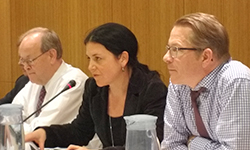 "Too many companies still face double taxation today." - this was the key-message of the Tax Policy Group when it welcomed officials from the European Commission to its meeting on 30 November. Morgan Guillou and Harmut Forster, Policy Officers from DG Taxud, discussed the Dispute Resolution Mechanism, which is part of the October 2015 Corporate Tax Reform Package. BusinessEurope believes that many businesses will very much welcome the Commission’s long over-due proposal to improve the EU’s double taxation dispute resolution mechanism. The Commission’s proposal can help to ensure that disputes between two or more member states claiming corporate tax on the same profit can now be resolved more quickly and more decisively.
"Too many companies still face double taxation today." - this was the key-message of the Tax Policy Group when it welcomed officials from the European Commission to its meeting on 30 November. Morgan Guillou and Harmut Forster, Policy Officers from DG Taxud, discussed the Dispute Resolution Mechanism, which is part of the October 2015 Corporate Tax Reform Package. BusinessEurope believes that many businesses will very much welcome the Commission’s long over-due proposal to improve the EU’s double taxation dispute resolution mechanism. The Commission’s proposal can help to ensure that disputes between two or more member states claiming corporate tax on the same profit can now be resolved more quickly and more decisively.
Contact: Pieter Baert
Calendar
- 1-5 December 2016: Transport, Telecommunications and Energy Council

- 4 December 2016: Italian constitutional referendum
- 4 December 2016: Austrian presidential election
- 5 December 2016: Eurogroup
- 6 December 2016: Economic and Financial Affairs Council